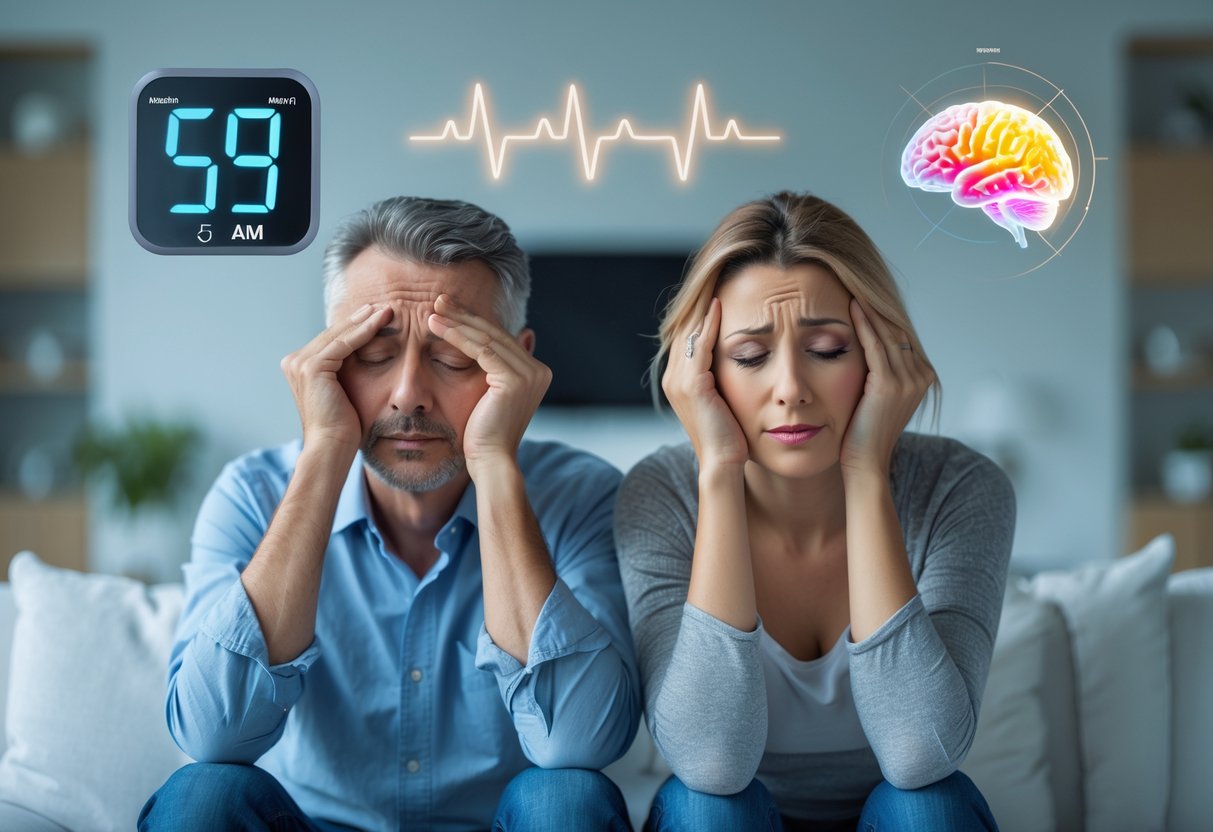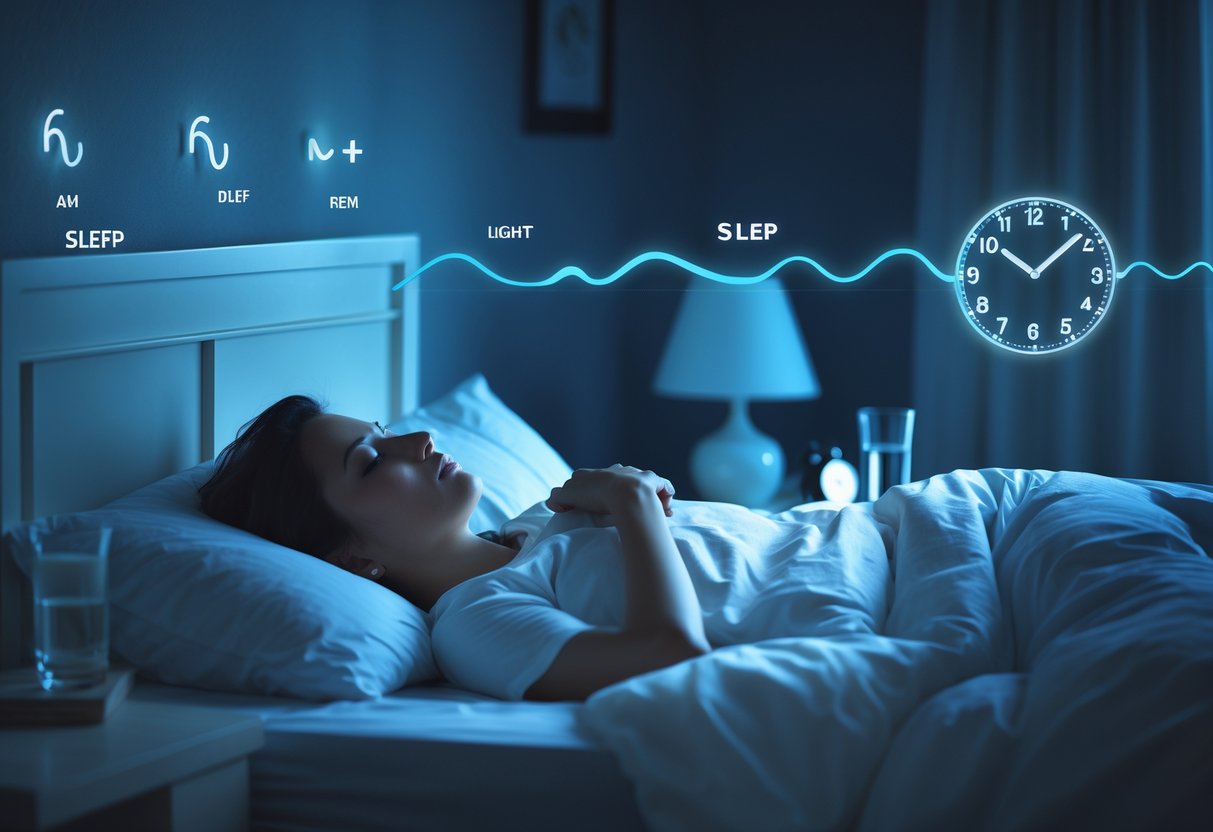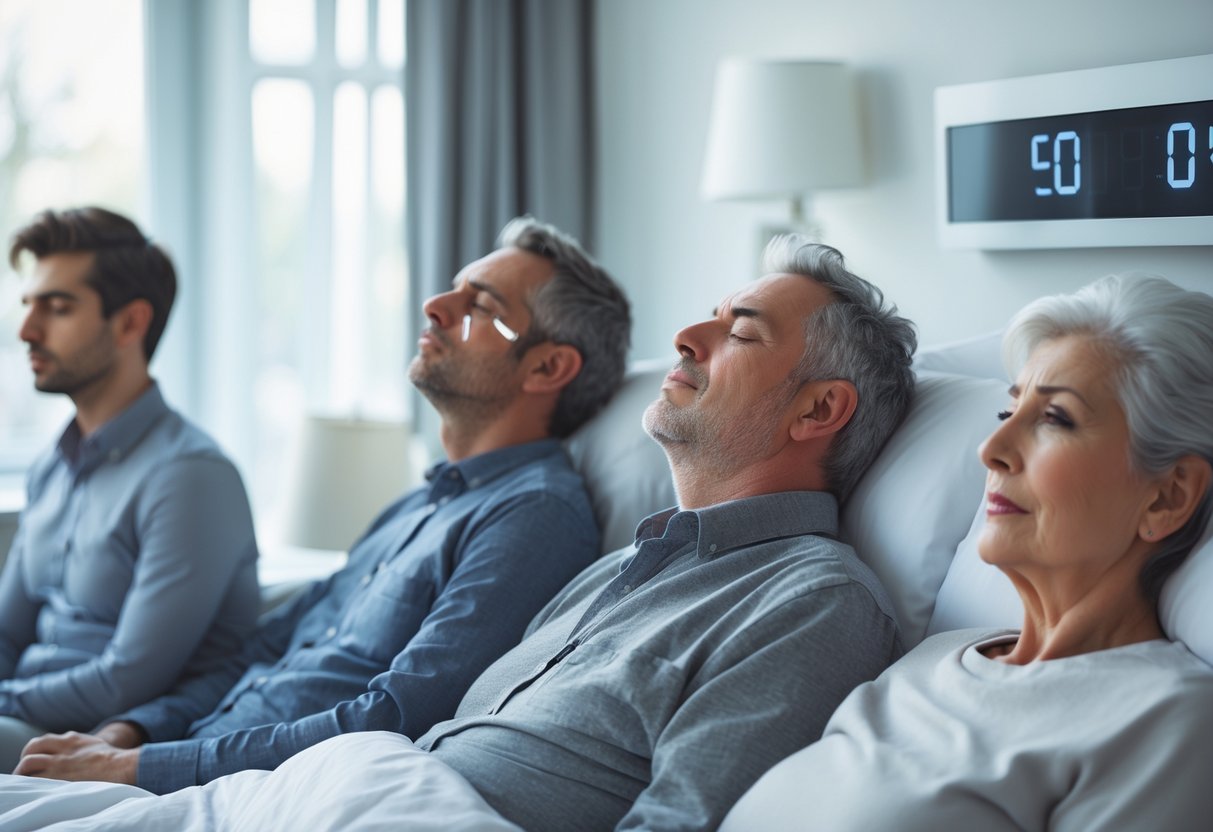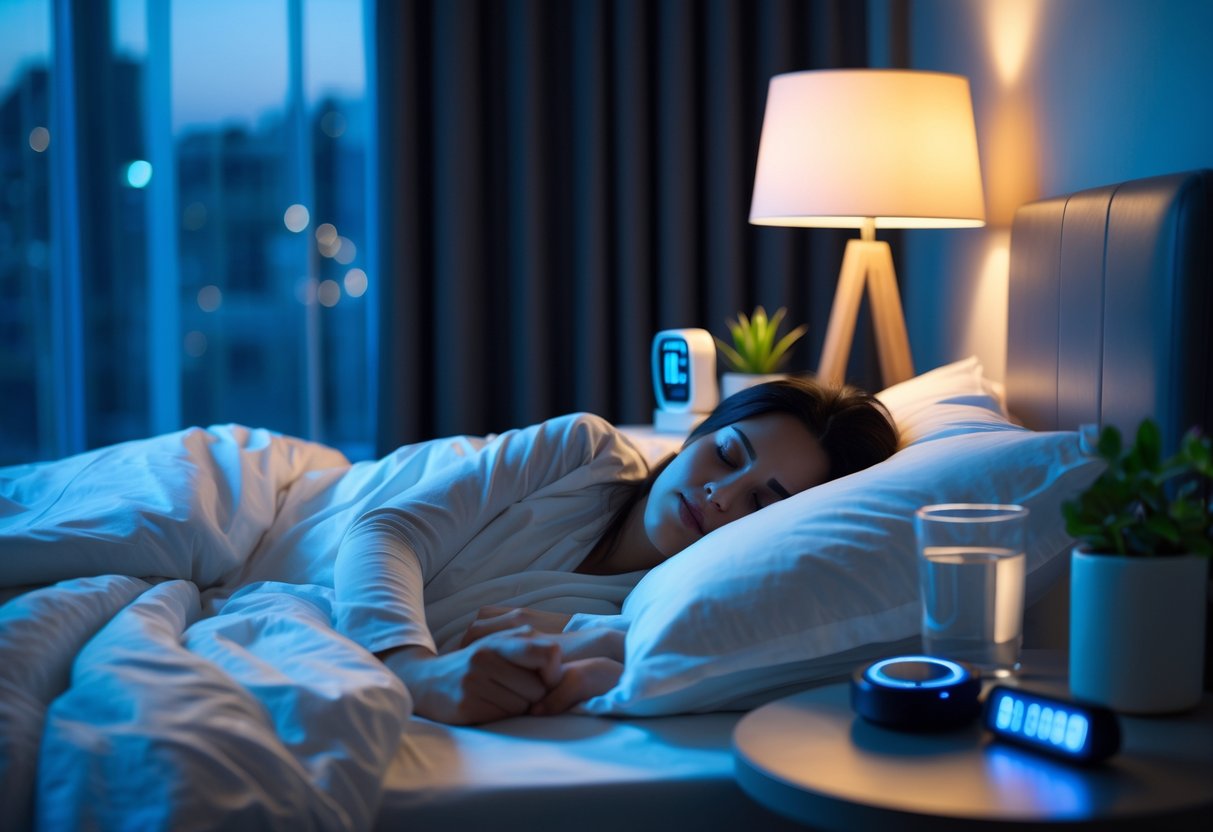Most adults need at least seven hours of sleep each night, yet millions regularly survive on just five hours or less. While some people believe they can function normally on minimal sleep, consistently getting only five hours of sleep triggers a cascade of negative effects throughout the body, impacting everything from cognitive function and mood to immune system strength and long-term disease risk.

The human body treats five hours of sleep as chronic sleep deprivation, not adequate rest. Within hours of shortened sleep, the brain struggles with concentration and memory formation, while stress hormones increase and emotional regulation becomes more difficult. These immediate changes represent just the beginning of how insufficient sleep disrupts normal bodily functions.
Understanding what happens during those missing hours of sleep reveals why the body requires more rest than many people provide. The effects extend far beyond simple tiredness, influencing mental performance, physical health, and even genetic factors that determine individual sleep needs.
Immediate Effects of Sleeping Only Five Hours

Getting just five hours of sleep triggers noticeable changes in mental and physical functioning within hours of waking. Sleep deprivation immediately impairs thinking abilities, destabilizes mood, and reduces the body’s energy reserves.
Impaired Cognitive Function and Concentration
Sleep deprivation significantly reduces cognitive performance after just one night of five hours of sleep. The brain struggles to process information efficiently, leading to slower decision-making and decreased problem-solving abilities.
Concentration becomes notably difficult. Tasks that normally require minimal mental effort become challenging. The mind wanders more frequently, and maintaining focus on work or daily activities requires extra effort.
Memory formation suffers immediately. The brain has difficulty encoding new information and retrieving previously learned material. This creates problems in work settings where learning and recall are essential.
Reaction times slow down considerably. Simple responses to stimuli take longer, affecting driving ability and workplace safety. The brain processes visual and auditory information more slowly than usual.
Complex reasoning abilities decline sharply. Multi-step problems become harder to solve, and abstract thinking suffers. These effects compound throughout the day as mental fatigue increases.
Mood Changes and Irritability
Five hours of sleep creates immediate emotional instability and mood disruptions. Irritability emerges as one of the first noticeable symptoms of sleep deprivation.
Stress tolerance drops significantly. Situations that would normally be manageable become overwhelming. The emotional response to minor inconveniences becomes disproportionately strong.
Anxiety levels often increase within hours of insufficient sleep. The nervous system becomes hyperactive, making relaxation difficult even during low-stress periods.
Emotional regulation becomes impaired. The ability to control responses to frustrating situations decreases. This leads to outbursts or emotional reactions that seem excessive for the circumstances.
Social interactions become more challenging. Patience with colleagues, family members, and friends diminishes. This can strain relationships and create workplace tension.
Reduced Physical Energy and Alertness
Physical energy levels drop noticeably after sleeping only five hours. The body struggles to maintain normal energy production and distribution throughout the day.
Alertness decreases within the first few hours of waking. This creates a persistent feeling of grogginess that affects all physical activities. Simple tasks require more effort than usual.
Muscle coordination suffers immediately. Fine motor skills become less precise, and overall physical performance declines. This affects everything from typing accuracy to athletic performance.
The immune system begins to weaken. White blood cell function decreases, making the body more susceptible to infections even after one night of poor sleep.
Microsleeps may occur involuntarily. These brief episodes of unconsciousness last seconds but can happen during important activities like driving or operating machinery, creating safety risks.
Long-Term Consequences for Health

Chronic sleep deprivation from consistently getting only five hours of sleep creates significant risks for cardiovascular disease, compromises immune function, and increases the likelihood of developing persistent sleep disorders.
Heart Disease and High Blood Pressure Risk
Sleep deprivation places considerable strain on the cardiovascular system. People who consistently get five hours or less of sleep face elevated risks for hypertension, heart attacks, and strokes.
The relationship between insufficient sleep and heart disease involves multiple mechanisms. Sleep loss triggers increased production of stress hormones like cortisol, which raises blood pressure and inflammation throughout the body.
Research shows that chronic sleep deprivation leads to higher rates of cardiovascular disease. The heart and circulatory system require adequate rest periods to repair and maintain optimal function.
Blood pressure regulation becomes impaired with persistent sleep loss. This creates a cycle where poor sleep leads to hypertension, which then further disrupts sleep quality and duration.
Weakened Immune System
The immune system depends heavily on adequate sleep to function properly. Five hours of sleep significantly compromises the body’s ability to fight infections and diseases.
Sleep deprivation reduces the production of protective cytokines and infection-fighting antibodies. This leaves individuals more susceptible to common illnesses like colds and flu.
Recovery time from illness increases substantially when sleep is insufficient. The body cannot effectively repair tissues or mount proper immune responses without adequate rest periods.
Vaccine effectiveness also decreases in sleep-deprived individuals. Their immune systems produce fewer antibodies in response to vaccinations, reducing protection against preventable diseases.
Increased Likelihood of Chronic Sleep Disorders
Consistently getting only five hours of sleep can trigger or worsen existing sleep disorders. This creates a problematic cycle where poor sleep leads to more severe sleep dysfunction.
Sleep apnea risk increases with chronic sleep deprivation. The body’s sleep regulation mechanisms become disrupted, leading to breathing interruptions during sleep.
Insomnia often develops as a secondary condition. People who initially lose sleep due to lifestyle factors may find they cannot sleep even when time allows.
Sleep debt accumulates over time, requiring approximately four days to recover from just one hour of missed sleep. This debt becomes increasingly difficult to repay as chronic patterns establish themselves.
Sleep Stages and Quality Sleep Loss

Five hours of sleep severely disrupts the natural sleep cycle progression and prevents adequate time in crucial deep sleep stages. This shortened sleep duration compromises the body’s ability to complete essential restorative processes that occur during quality sleep periods.
Disrupted Sleep Stages and Deep Sleep
A complete sleep cycle takes 90 to 120 minutes to progress through all stages. With only five hours of sleep, the body can complete approximately 2-3 full cycles instead of the optimal 4-5 cycles.
Stage 3 deep sleep suffers the most significant reduction. This stage typically comprises 25% of total sleep time in healthy adults. With truncated sleep, deep sleep may drop to just 15-20% of the shortened period.
The brain prioritizes deep sleep when sleep-deprived. However, five hours simply doesn’t provide enough time for adequate deep sleep accumulation.
REM sleep also gets compressed. This dream stage usually increases in duration during later sleep cycles. People sleeping only five hours miss critical REM periods that typically occur in the final hours of normal sleep.
Stage 2 sleep, which normally accounts for 45% of sleep time, may maintain its proportion. However, the absolute time spent in this restorative stage decreases significantly with shortened sleep duration.
Poor Sleep Quality and Restoration Deficits
Quality sleep requires sufficient time in each sleep stage for proper restoration. Five hours creates multiple restoration deficits across bodily systems.
Deep sleep stage 3 handles critical repair functions. During this phase, the body reinforces the immune system and repairs tissue damage. Insufficient deep sleep compromises these essential processes.
The brain uses deep sleep periods for memory consolidation and learning. Reduced deep sleep time directly impacts cognitive restoration and memory storage capabilities.
REM sleep manages emotional processing and brain maintenance. Limited REM periods from shortened sleep affect mood regulation and mental health stability. The brain cannot adequately process emotions or clear metabolic waste.
Sleep quality depends on uninterrupted progression through all stages. Even if someone achieves five hours of continuous rest, the compressed timeframe prevents optimal restoration in each critical sleep phase.
Mental and Emotional Impacts

Sleep restriction to five hours creates significant disruptions in brain function that affect mood regulation, memory formation, and long-term cognitive health. These changes occur within just one night of inadequate rest and compound over time.
Anxiety and Emotional Health
Limited sleep dramatically impairs the brain’s ability to process emotions effectively. The amygdala, which controls emotional responses, becomes hyperactive after sleep deprivation.
Research from the University of Pennsylvania demonstrates that people restricted to 4.5 hours of sleep for one week report feeling more stressed, angry, sad, and mentally exhausted. These mood changes occur rapidly and predictably.
Sleep-deprived individuals show a 300% increase in emotional reactivity compared to well-rested people. The prefrontal cortex, responsible for emotional regulation, cannot effectively manage the overactive amygdala.
People with chronic sleep restriction face significantly higher risks of developing anxiety disorders. Those with insomnia are 17 times more likely to experience anxiety compared to the general population.
The relationship between sleep and mental health operates bidirectionally. Poor sleep worsens anxiety symptoms, while anxiety can further disrupt sleep patterns, creating a cycle of worsening mental health.
Memory and Cognitive Performance
Five hours of sleep severely compromises multiple aspects of cognitive function. Memory consolidation, which primarily occurs during deep sleep stages, becomes significantly impaired.
The brain requires adequate sleep to transfer information from short-term to long-term memory. With only five hours, this process remains incomplete, leading to poor retention of newly learned information.
Working memory suffers substantial deficits after sleep restriction. Tasks requiring focus, problem-solving, and decision-making become notably more difficult and error-prone.
Attention span decreases markedly with insufficient sleep. People experience frequent lapses in concentration and struggle to maintain focus on important tasks throughout the day.
Processing speed slows considerably, affecting reaction times and the ability to respond quickly to changing situations. This impairment affects both mental tasks and physical coordination.
Increased Risk of Dementia
Chronic sleep deprivation may accelerate brain aging and increase dementia risk through several biological mechanisms. The brain’s waste clearance system operates primarily during sleep.
During deep sleep, the brain removes toxic proteins including beta-amyloid plaques associated with Alzheimer’s disease. Five hours of sleep provides insufficient time for this critical cleaning process.
Studies indicate that people consistently sleeping less than six hours nightly show increased accumulation of these harmful proteins. This buildup occurs years before dementia symptoms appear.
Sleep restriction also promotes chronic inflammation in brain tissue. This inflammatory response damages neurons and contributes to cognitive decline over time.
The hippocampus, crucial for memory formation, shows structural changes after prolonged sleep deprivation. These alterations may contribute to accelerated cognitive aging and increased vulnerability to neurodegenerative diseases.
Understanding Short Sleepers and Genetic Factors

A small percentage of people possess rare genetic mutations that allow them to function normally on just four to six hours of sleep per night. However, most individuals cannot adapt to consistently sleeping only five hours without experiencing significant health consequences.
Natural Short Sleepers and Gene Mutations
Natural short sleepers represent only 1-3% of the population and possess specific genetic variations that fundamentally alter their sleep requirements. These individuals need six hours or less of sleep per night due to inherited gene mutations that run in families.
Researchers have identified over 50 families containing people who require less than 6.5 hours of sleep to feel completely refreshed. The first major genetic findings were published in 2009, with scientists discovering mutations in genes like BHLHE41 and β1-adrenergic receptor.
Key characteristics of natural short sleepers:
- Sleep 4-6 hours nightly without alarm clocks
- Wake up energetic and alert
- No daytime drowsiness or fatigue
- Maintain this pattern throughout their lifespan
These genetic variations protect natural short sleepers from the typical health consequences of insufficient sleep. Unlike people who restrict sleep to five hours, they show no increased risk of cardiovascular disease, diabetes, or cognitive impairment.
Misconceptions About Adapting to Short Sleep
Many people mistakenly believe they can train their bodies to function on five hours of sleep, but scientific evidence contradicts this assumption. Non-short sleepers who consistently sleep less than seven hours experience cognitive impairment and increased health risks.
The critical difference lies in genetics rather than adaptation. When individuals without short sleeper genes restrict their sleep to five hours, they suffer from sleep deprivation despite feeling they have adjusted to the schedule.
Signs you are not a natural short sleeper:
- Sleeping longer on weekends or vacations
- Feeling groggy upon waking
- Experiencing afternoon fatigue
- Needing caffeine to stay alert
Research shows that people with insomnia or those who intentionally restrict sleep face higher risks of heart attacks, cardiovascular disease, and type 2 diabetes. True genetic short sleepers do not experience these adverse effects because their brains require genuinely less sleep to function optimally.
Who Is Most Affected by Five Hours of Sleep

Sleep duration needs vary significantly across age groups, with certain populations facing heightened risks from chronic sleep restriction. Adults require different amounts of sleep than children, and some groups are more vulnerable to the health consequences of insufficient rest.
Sleep Needs by Age Group
Different age groups have distinct sleep requirements, making some more susceptible to the negative effects of five-hour sleep patterns.
Adults (18+ years) need at least 7 hours of sleep nightly according to sleep recommendations. Getting only 5 hours represents a significant deficit that affects cognitive function and physical health.
Teenagers (13-18 years) require 8-10 hours of sleep per night. Five hours creates an even larger sleep debt for this age group, potentially impacting academic performance and emotional regulation.
School-age children (6-12 years) need 9-12 hours of sleep. A five-hour schedule severely compromises their development, learning capacity, and immune function.
| Age Group | Recommended Hours | 5-Hour Impact |
|---|---|---|
| Adults (18+) | 7+ hours | Moderate deficit |
| Teens (13-18) | 8-10 hours | Severe deficit |
| School-age (6-12) | 9-12 hours | Critical deficit |
Older adults often experience natural changes in sleep patterns but still require adequate rest for optimal health.
Vulnerable Populations and Sleep Deprivation
Certain groups face increased risks when getting insufficient sleep due to existing health conditions or life circumstances.
Shift workers are particularly affected by irregular sleep schedules. Five hours of daytime sleep often provides lower quality rest than nighttime sleep, compounding the effects of sleep deprivation.
Individuals with chronic health conditions such as diabetes, heart disease, or mental health disorders experience amplified negative effects. Their bodies require more recovery time, making adequate sleep duration even more critical.
People taking medications may find that five hours of sleep interferes with drug effectiveness or increases side effects. Some medications also disrupt natural sleep cycles.
Parents of young children often operate on reduced sleep but face increased demands for cognitive function and emotional regulation. The combination creates heightened vulnerability to sleep deprivation effects.
Those with existing sleep disorders like sleep apnea or insomnia may find that five hours represents their maximum achievable sleep, creating a cycle of chronic deprivation.
How to Improve Sleep When Sleeping Five Hours

Maximizing sleep quality becomes critical when sleep duration is limited to five hours. Strategic improvements to sleep hygiene, environment optimization, and careful management of caffeine, sugar, and screen exposure can significantly enhance rest quality despite shortened sleep time.
Sleep Hygiene and Healthy Sleep Habits
Maintaining consistent sleep and wake times helps regulate the body’s internal clock, even with limited sleep hours. Going to bed and waking up at the same time daily strengthens circadian rhythms and improves sleep efficiency.
A structured bedtime routine signals the body to prepare for sleep. This routine should begin 30-60 minutes before sleep and include calming activities like reading or gentle stretching.
Key sleep hygiene practices include:
- Keeping the bedroom for sleep only
- Avoiding large meals within 3 hours of bedtime
- Taking a warm shower or bath before sleep
- Using relaxation techniques like deep breathing
Sleep latency should target 15-20 minutes for optimal efficiency. Longer periods may indicate poor sleep preparation or environmental issues.
The body requires consistent signals to maximize the limited sleep window available.
Optimizing Your Sleep Environment
Temperature control significantly impacts sleep quality during shortened sleep periods. The ideal bedroom temperature ranges between 65-68°F (18-20°C) for most people.
Darkness promotes melatonin production and deeper sleep phases. Blackout curtains, eye masks, or eliminating electronic light sources help create optimal darkness.
Environmental optimization checklist:
- Temperature: 65-68°F with breathable bedding
- Noise: White noise machine or earplugs for consistency
- Lighting: Complete darkness or dim red lighting only
- Air quality: Proper ventilation and humidity levels around 30-50%
Sound management prevents sleep fragmentation during the limited sleep window. Consistent background noise often works better than complete silence in urban environments.
The sleep surface should provide adequate support without causing pressure points that lead to frequent position changes.
Caffeine, Sugar, and Screen Time Effects
Caffeine remains in the system for 6-8 hours after consumption. People sleeping only five hours should avoid caffeine after 2 PM to prevent interference with sleep onset and quality.
Sugar consumption within 4 hours of bedtime can cause blood sugar fluctuations that disrupt sleep continuity. Complex carbohydrates provide more stable energy without sleep disruption.
Screen time management guidelines:
- No screens 1-2 hours before bedtime
- Blue light blocking glasses if screen use necessary
- Phone charging outside the bedroom
- Using airplane mode to prevent notifications
Blue light exposure suppresses melatonin production for up to 3 hours. This effect becomes more pronounced when sleep duration is already compromised.
Electronic devices should be removed from the sleep environment entirely. The bedroom should remain a technology-free zone to maximize sleep quality during the limited available time.
